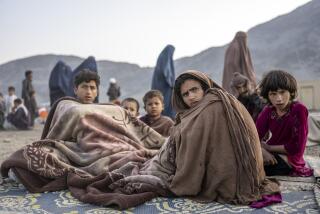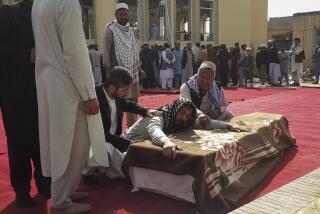Pakistan Defends Its Efforts to Find Militants
- Share via
ISLAMABAD, Pakistan — A top Pakistani official delivered a muscular defense Tuesday of his nation’s effort to track down Al Qaeda and Taliban insurgents in its territory and to help ease warfare in neighboring Afghanistan.
Foreign Minister Mian Khursheed Mehmood Kasuri’s response to suggestions that Pakistan had not done enough to rein in the militants came after he and the country’s leader, President Pervez Musharraf, met with U.S. Secretary of State Condoleezza Rice.
Rice in turn offered praise to Pakistan and Afghanistan, saying they were united in their efforts to counter the threat posed by Al Qaeda and the Taliban.
The secretary was beginning a two-day visit to the South Asian nations to shore up anti-terrorism efforts, promote democracy and demonstrate anew U.S. support for Afghan President Hamid Karzai. She is scheduled to meet today with Karzai during a roughly five-hour visit to Afghanistan.
Her trip, which will also include Russia, encapsulates major goals of the Bush administration’s foreign policy: seeking to promote democratic growth as a weapon against terrorism and to undercut potential nuclear proliferation.
Visits by senior U.S. officials to Pakistan regularly revolve around questions of how devoted Musharraf, an army general who has refused to give up his military post, is to pushing his country toward democracy and how quickly he will move. Those issues drew attention during President Bush’s visit here in March.
On the final two days of the trip, Rice will meet in Moscow with foreign ministers of the Group of 8 industrialized nations, which consist of the United States, Russia, Britain, Canada, France, Germany, Italy and Japan. The conference is expected to focus largely on efforts to restrain what the officials see as Iran’s efforts to develop a nuclear weapon.
The question of PakistaniAfghan cooperation to fight militant groups along their shared border has drawn renewed interest recently as insurgent attacks have intensified in the Kandahar region of southern Afghanistan.
Kasuri, growing animated, said he recently met with his Afghan counterpart, addressing him as “brother.” He insisted that no country was more interested than Pakistan in seeing Afghanistan become a stable democracy, given the latter’s potential role in helping ship energy supplies from Central Asia to market.
He spoke at a news conference with Rice, and was responding to a questioner who cited Karzai’s often-voiced complaint that Pakistan had not done enough to root out insurgents hiding in what is widely referred to as its ungoverned tribal area along the border.
Pakistan, he said, had given refuge to 4 million people from Afghanistan who fled during a decade of Soviet control, a period followed by chaos and the eventual rise of the Taliban regime. The radical Islamic group was routed in the U.S.-led invasion in 2001 that followed the Sept. 11 attacks.
Kasuri said Pakistan had dispatched 80,000 troops to the border region.
Referring to a Pakistani city that is believed to be a refuge for Afghan insurgents, Kasuri said his government was trying to support the building of stable institutions in Afghanistan and that “saying so-and-so is hiding in Quetta will get you nowhere.”
His energetic response suggested that Pakistan, which walks a line between Islamic fundamentalism and more moderate politics, is sensitive to having its commitment to fighting terrorism challenged.
Rice said the U.S., Pakistan and Afghanistan were working “toward the goal of eliminating the threat” posed by Al Qaeda and the Taliban.
More to Read
Sign up for Essential California
The most important California stories and recommendations in your inbox every morning.
You may occasionally receive promotional content from the Los Angeles Times.












